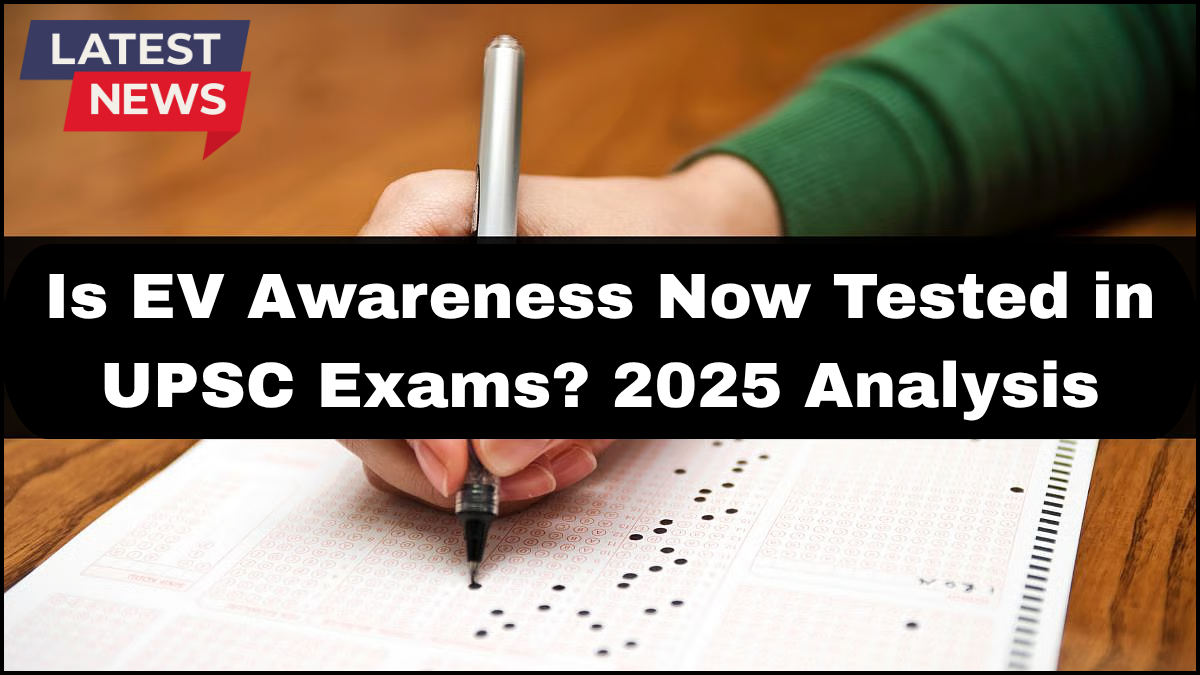The Union Public Service Commission (UPSC) is known for adapting its syllabus to reflect contemporary issues and pressing global concerns. In recent years, one such subject gaining attention is electric vehicles (EVs). As India accelerates its push toward sustainable transportation, EV-related questions in UPSC exams have started to surface with noticeable frequency. The 2025 exam cycle reveals a clear trend: understanding EV technology, policy, and environmental implications is no longer optional for serious aspirants.

Understanding the Context: Why EVs Matter for UPSC
Electric vehicles are at the crossroads of environment, technology, economics, and public policy—domains deeply embedded in the UPSC syllabus. India’s goal to transition to 30% EV usage by 2030 under the FAME (Faster Adoption and Manufacturing of Hybrid and Electric Vehicles) initiative signals a significant national priority. Consequently, UPSC has begun to integrate EV-related questions to test candidates’ awareness of sustainable development, energy alternatives, and policy frameworks.
Whether in the prelims under current affairs or in mains through GS Paper III (Technology, Environment, Economic Development), the presence of EV-centric content is becoming more evident.
EV-Related Questions in UPSC: A Growing Pattern
A close examination of recent papers shows a discernible increase in EV-related questions in UPSC—ranging from factual queries about government initiatives to analytical prompts requiring critical evaluation of EV adoption challenges.
Examples include:
-
Questions on India’s EV roadmap and policy instruments like FAME II.
-
Essay topics exploring the viability of electric mobility in rural India.
-
Analytical questions around battery technology, charging infrastructure, and grid sustainability.
In the 2024 mains, one essay paper even included a prompt on “Electric Mobility as a Pillar of India’s Green Future,” demonstrating how integral EV awareness has become.
Exam Pattern Update: How UPSC is Evolving
Though the core UPSC syllabus hasn’t been overhauled, there’s been a quiet but important exam pattern update—with current affairs now drawing heavily from sectors like green energy, digital economy, and mobility innovation.
UPSC no longer restricts itself to traditional static questions. Dynamic topics like EV adoption allow the exam to test candidates’ comprehension, analytical depth, and ability to interlink different domains such as:
-
Policy & Governance (EV subsidies, state-level initiatives)
-
Science & Tech (battery chemistry, AI in EVs)
-
Environment (carbon reduction, e-waste concerns)
-
Economy (investment, job creation, Make in India)
This integrated approach aligns with the UPSC’s broader objective of assessing holistic thinkers capable of navigating complex policy challenges.
How Aspirants Should Prepare for EV Topics
Given the growing importance of EV-related questions in UPSC, aspirants need to go beyond surface-level understanding. Preparation must include:
-
Policy Documents: Study government whitepapers, EV roadmaps, and international comparisons.
-
Current Affairs: Regularly track updates from NITI Aayog, Ministry of Heavy Industries, and Budget announcements.
-
Technological Concepts: Learn basics of lithium-ion batteries, hydrogen fuel cells, and energy storage solutions.
-
Case Studies: Look at EV adoption in states like Delhi, Tamil Nadu, and Karnataka for grounded examples.
Integrating EVs into your notes under relevant GS Papers and optional subjects like Geography or Public Administration can also add depth to your answers.
Implications for Future Civil Servants
By including EVs in the exam, UPSC signals what it expects from future administrators: an awareness of sustainable development, tech-driven policy shifts, and India’s global environmental commitments. Officers today need to be prepared to shape and implement policies in a world moving towards net-zero emissions. Understanding the EV ecosystem is not just academically relevant—it’s administratively essential.
FAQs
Q1: Are EV-related questions included in all stages of the UPSC exam?
Yes. In the prelims, EV topics appear under current affairs and environment. In mains, they feature in GS Papers II and III, and even in essays.
Q2: Will the UPSC syllabus officially include EVs in the future?
While the syllabus itself may not name “EVs” directly, the pattern indicates growing weightage through dynamic current affairs and analytical topics.
Q3: How can I stay updated on EV developments for UPSC prep?
Follow official sources like PIB, NITI Aayog, Ministry of Road Transport, and credible newspapers. Monthly current affairs digests also help.
Q4: What kind of EV-related questions should I expect in interviews?
Expect situational and opinion-based questions—like handling EV infrastructure in your district or balancing EV subsidies with fiscal responsibility.
Q5: Are EV topics relevant for optional subjects too?
Absolutely. Geography (urban planning), Public Administration (policy implementation), and Sociology (technology’s societal impact) all offer space for EV integration.
click here to learn more